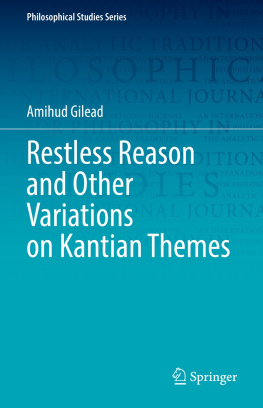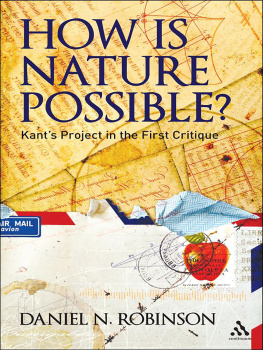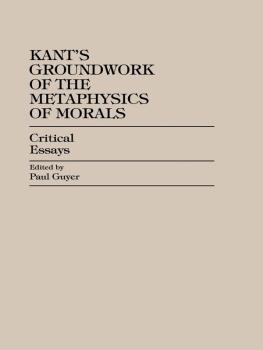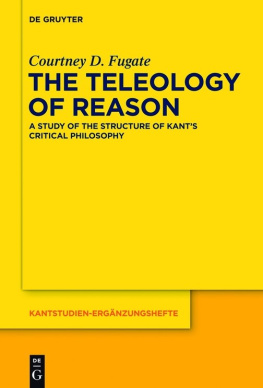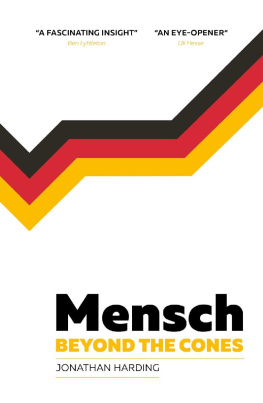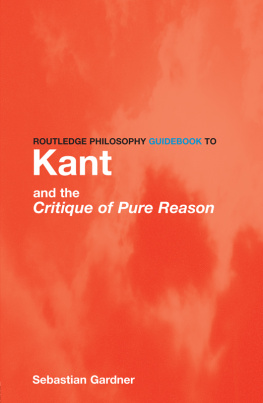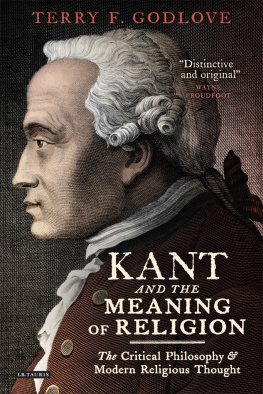Mensch Jennifer - Kants Organicism: Epigenesis and the Development of Critical Philosophy
Here you can read online Mensch Jennifer - Kants Organicism: Epigenesis and the Development of Critical Philosophy full text of the book (entire story) in english for free. Download pdf and epub, get meaning, cover and reviews about this ebook. year: 2013, publisher: University of Chicago Press, genre: Religion. Description of the work, (preface) as well as reviews are available. Best literature library LitArk.com created for fans of good reading and offers a wide selection of genres:
Romance novel
Science fiction
Adventure
Detective
Science
History
Home and family
Prose
Art
Politics
Computer
Non-fiction
Religion
Business
Children
Humor
Choose a favorite category and find really read worthwhile books. Enjoy immersion in the world of imagination, feel the emotions of the characters or learn something new for yourself, make an fascinating discovery.

- Book:Kants Organicism: Epigenesis and the Development of Critical Philosophy
- Author:
- Publisher:University of Chicago Press
- Genre:
- Year:2013
- Rating:3 / 5
- Favourites:Add to favourites
- Your mark:
- 60
- 1
- 2
- 3
- 4
- 5
Kants Organicism: Epigenesis and the Development of Critical Philosophy: summary, description and annotation
We offer to read an annotation, description, summary or preface (depends on what the author of the book "Kants Organicism: Epigenesis and the Development of Critical Philosophy" wrote himself). If you haven't found the necessary information about the book — write in the comments, we will try to find it.
Mensch Jennifer: author's other books
Who wrote Kants Organicism: Epigenesis and the Development of Critical Philosophy? Find out the surname, the name of the author of the book and a list of all author's works by series.
Kants Organicism: Epigenesis and the Development of Critical Philosophy — read online for free the complete book (whole text) full work
Below is the text of the book, divided by pages. System saving the place of the last page read, allows you to conveniently read the book "Kants Organicism: Epigenesis and the Development of Critical Philosophy" online for free, without having to search again every time where you left off. Put a bookmark, and you can go to the page where you finished reading at any time.
Font size:
Interval:
Bookmark:
JENNIFER MENSCH teaches philosophy and the history of science and medicine at the Pennsylvania State University.
The University of Chicago Press, Chicago 60637
The University of Chicago Press, Ltd., London
2013 by The University of Chicago
All rights reserved. Published 2013.
Printed in the United States of America
22 21 20 19 18 17 16 15 14 13 1 2 3 4 5
ISBN-13: 978-0-226-02198-0 (cloth)
ISBN-13: 978-0-226-02203-1 (e-book)
Library of Congress Cataloging-in-Publication Data
Mensch, Jennifer.
Kants organicism: epigenesis and the development of critical philosophy / Jennifer Mensch.
pages. cm.
Includes bibliographical references and index.
ISBN 978-0-226-02198-0 (cloth: alk. paper)ISBN 978-0-226-02203-1 (e-book) 1. Kant, Immanuel, 17241804. 2. Philosophy of nature. I. Title.
B2799.N37M46 2013
193dc23 2012043133
 This paper meets the requirements of ANSI/NISO Z39.48-1992 (Permanence of Paper).
This paper meets the requirements of ANSI/NISO Z39.48-1992 (Permanence of Paper).
Kants Organicism
Epigenesis and the Development of Critical Philosophy
JENNIFER MENSCH
The University of Chicago Press
Chicago and London
For Zoe, whose flourishing has lived up entirely
to the promise of her name.
Systems seem to be formed in the manner of lowly organisms, through a generatio aequivoca from the mere confluence of assembled concepts, at first imperfect, and only gradually attaining to completeness, although they have one and all had their schema, as the original germ, in the sheer self-development of reason. Hence, not only is each system articulated in accordance with an idea, but they are one and all organically united in a system of human knowledge, as members of one whole, and so as admitting of an architectonic of all human knowledge.
CRITIQUE OF PURE REASON, A835/B863
Contents
Preface
Immanuel Kant has maintained an enduring intellectual presence through his works on morality, reason, history, and art. He created the first university courses on physical geography and anthropology, and throughout his career he taught logic and metaphysics alongside courses discussing everything from taste to table etiquette. It is estimated that by the time Kant died there were already well over three thousand published pieces devoted to his work, and even as Kants general influence waned toward the end of the nineteenth century, new currents emerged such that Neo-Kantianism came to describe a number of schools in philosophy. Kants moral theory remains to this day a pillar of classical ethics and a centerpiece in contemporary bioethical discussions of autonomy and patients rights, and he continues to hold interdisciplinary appeal across various fields of law, science, and the humanities. In recent times, Kant has attracted added attention from historians of science and critical race theorists for his work in natural history and, as some have it, for his invention of the concept of race. It is such long-standing and widespread interest in Kants work, interest stemming from all manner of intellectual backgrounds and any number of investigatory goals, that has made Kant one of the most widely discussed authors in the history of ideas.
Given the very breadth of Kant scholarship, it is perhaps useful to locate this book, at least in a topographical vein, within its appropriate region. Kants Organicism starts by tracing the history of the life sciences as Kant would have come to know them, focusing especially on those , with the details left to be developed in the chapters that follow.
There are a great many people to thank when one writes a book, and I am glad for the opportunity here to express my gratitude for all of the help and support I received along the way. Tracking down obscure historical references is a time-consuming endeavor, and I was fortunate throughout to have had the tireless help of Claudia Villafranca from Pennsylvania State Universitys Interlibrary Loan division. Special thanks go to Mary Terrall for not only generously sharing her private notes on Maupertuiss Baumann thesis but also pointing me toward Berlin as a resource for this manuscript in the first place. Peggy Price, curator of Special Collections at the University of Southern Mississippi, patiently went through volumes of the German edition of Buffons Histoire naturelle in search of references for me. Eric Watkins gave special help with translation questions related to Kants scientific works dating from his earliest precritical writings; Holly Wilson was intrepid in resolving a number of problems, dating and otherwise, regarding Kants anthropological essays and lectures; and Robert J. Richards provided both feedback and guidance concerning the relationship between Blumenbach and Kant. Three of my colleagues in the Department of Philosophy are to be especially thanked for their continuous support and encouragement regarding the project, Robert Bernasconi, Brady Bowman, and Mark Fisher. My thanks also to Peter Giannopoulos, who lent his talent and energy to the book in its final stages by preparing the bibliography.
When I began this book, I had already been lecturing on Kant for a good number of years, and it is a pleasure to express my appreciation here for the Kant scholars whose teaching and work first inspired me as their student and whose influence has continued to affect me as a professor and scholar. For this I want to thank Rudolf Makkreel, Eckart Frster, Manfred Kuehn, Hoke Robinson, and Mark Timmons. Kants Organicism also benefited from the readers comments made by John Zammito and Gnter Zller; I am grateful for the time and energy they put into their reviews, and I hope they will feel that the book has been improved as a result. At the University of Chicago Press David Brent has been ideal as both an editor and overall supporter of the project; his editorial associate, Priya Nelson, has been in equal measure efficient, friendly, and helpful in steering the book through all its various stages from review to production. Finally, I am especially grateful for George Roupes careful work and thoughtful suggestions when copyediting the final manuscript for Chicago.
I received a great deal of support while writing this book from my family, including, of course, my dog Ollie, who stayed by my side during every minute that I worked on it. My mother and father, Josephine and James Mensch, and my brother and sister, Joshua and Jessica Mensch, have been as good as it gets for unconditional support, encouragement, and general partisanship on my behalf during the entire process from beginning to end. My daughter, Zoe Mensch Schmidt, has been both patient beyond her years and full of good suggestions for wrapping up the project a bit more speedily than it has been, reminding me with some significance on more than one occasion that staples have always worked well for her when putting the finishing touches on one of her own books. My greatest thanks of all go to my husband, Dennis J. Schmidt, who not only read through and edited the manuscript three times from beginning to end but kept the house and everything in it, not least including me, sane, organized, and happy; for that and more, Denny, thank you.
A portion of appeared previously in slightly different form as Understanding Affinity: Locke on Generation and the Task of Classification, Locke Studies 11 (2011): 4971. The image used in the conclusion is a reproduction of the title page of Francis Bacons Instauratio Magna, held by the Rare Books Collection at the University of Chicago Library; my thanks to the staff at the Special Collections Research Center for their help in procuring the image and granting permission for its use.
Next pageFont size:
Interval:
Bookmark:
Similar books «Kants Organicism: Epigenesis and the Development of Critical Philosophy»
Look at similar books to Kants Organicism: Epigenesis and the Development of Critical Philosophy. We have selected literature similar in name and meaning in the hope of providing readers with more options to find new, interesting, not yet read works.
Discussion, reviews of the book Kants Organicism: Epigenesis and the Development of Critical Philosophy and just readers' own opinions. Leave your comments, write what you think about the work, its meaning or the main characters. Specify what exactly you liked and what you didn't like, and why you think so.

